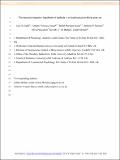The neuronal migration hypothesis of dyslexia : a critical evaluation 30 years on
Abstract
The capacity for language is one of the key features underlying the complexity of human cognition and its evolution. However, little is known about the neurobiological mechanisms that mediate normal or impaired linguistic ability. For developmental dyslexia, early postmortem studies conducted in the 1980s linked the disorder to subtle defects in the migration of neurons in the developing neocortex. These early studies were reinforced by human genetic analyses that identified dyslexia susceptibility genes and subsequent evidence of their involvement in neuronal migration. In this review, we examine recent experimental evidence that does not support the link between dyslexia and neuronal migration. We critically evaluate gene function studies conducted in rodent models and draw attention to the lack of robust evidence from histopathological and imaging studies in humans. Our review suggests that the neuronal migration hypothesis of dyslexia should be reconsidered, and the neurobiological basis of dyslexia should be approached with a fresh start.
Citation
Guidi , L G , Velayos-Baeza , A , Martinez-Garay , I , Monaca , A P , Paracchini , S , Bishop , D V M & Molnár , Z 2018 , ' The neuronal migration hypothesis of dyslexia : a critical evaluation 30 years on ' , European Journal of Neuroscience , vol. 48 , no. 10 , pp. 3212-3233 . https://doi.org/10.7287/peerj.preprints.26637v1 , https://doi.org/10.1111/ejn.14149
Publication
European Journal of Neuroscience
Status
Peer reviewed
ISSN
0953-816XType
Journal item
Description
This work was supported by the Wellcome Trust (092071/Z/10/Z to A.P.M., Z.M. and A.V.-B., and 082498/Z/07/Z to D.V.M.B.); L.G.G. receive a Doctoral Training Award from the Medical Research Council; S.P. is a Royal Society University Research Fellow.Collections
Items in the St Andrews Research Repository are protected by copyright, with all rights reserved, unless otherwise indicated.

